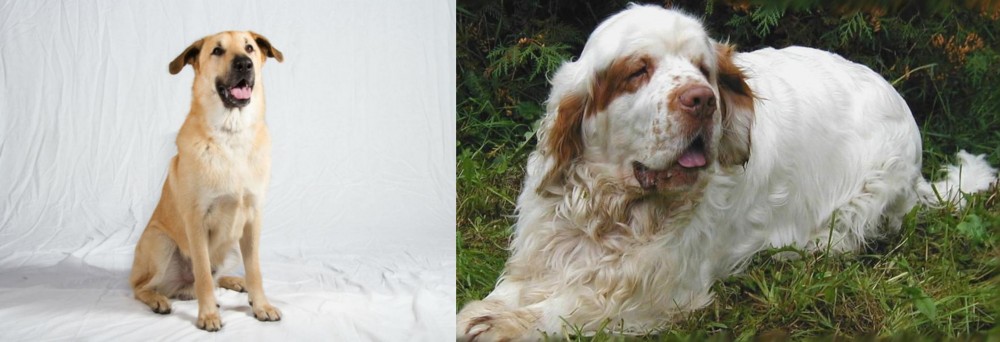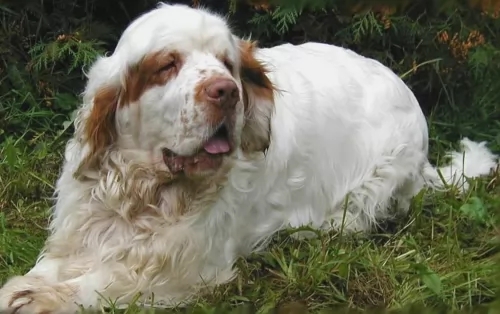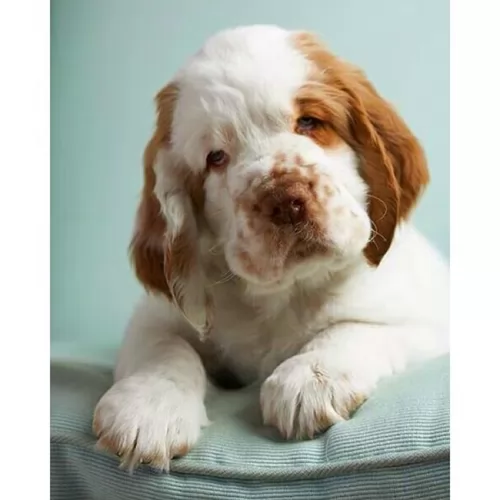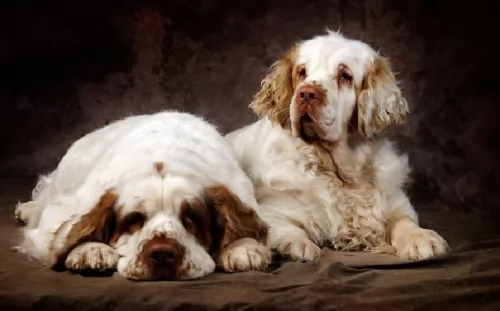 Petzlover
Petzlover Chinook is originated from United States but Clumber Spaniel is originated from United Kingdom. Chinook may grow 18 cm / 8 inches higher than Clumber Spaniel. Both Chinook and Clumber Spaniel are having almost same weight. Chinook may live 3 years more than Clumber Spaniel. Both Chinook and Clumber Spaniel has almost same litter size. Both Chinook and Clumber Spaniel requires High Maintenance.
Chinook is originated from United States but Clumber Spaniel is originated from United Kingdom. Chinook may grow 18 cm / 8 inches higher than Clumber Spaniel. Both Chinook and Clumber Spaniel are having almost same weight. Chinook may live 3 years more than Clumber Spaniel. Both Chinook and Clumber Spaniel has almost same litter size. Both Chinook and Clumber Spaniel requires High Maintenance.
 In the early 20th century, in the small town of Wonalancet, New Hampshire a new breed of dog called the Chinook was born. Developed by Arthur Treadwell Walden, the breed is named after the first male ancestor who was named Chinook. The breed is a rare sled dog and the official dog of the state of New Hampshire. The Chinook was born of a cross between a large Mastiff-like street dog and huskies that were part of the Peary North Pole expedition.
In the early 20th century, in the small town of Wonalancet, New Hampshire a new breed of dog called the Chinook was born. Developed by Arthur Treadwell Walden, the breed is named after the first male ancestor who was named Chinook. The breed is a rare sled dog and the official dog of the state of New Hampshire. The Chinook was born of a cross between a large Mastiff-like street dog and huskies that were part of the Peary North Pole expedition.
Walden was an experienced slender and looking for a dog that was stronger, faster and had more stamina than his current sled dogs. Walden had years of experience including being the trainer and lead on Byrd’s 1929 Antarctic expedition and plenty of Yukon experience. Once he had the male Chinook he bred him with German Shepherds, Belgian Sheepdogs and Canadian Eskimo Dogs at the very least. He then bred those puppies back to Chinook until he had the type and traits he wanted. Following Walden, Julia Lombard and then Perry Greene took over mastery of the breed. From the 1940’s until he died in 1963, Greene was the only person who was breeding Chinooks. So, there were few left after his death. The breed neared extinction by 1981 with only 11 Chinooks available to breed. These dogs were divided between three breeders who saved the breed from becoming extinct.
In 1991, the United Kingdom recognized the Chinook and they were also registered with the UKC. At that time there were about 800 dogs in the breed. To increase the breed, there was a cross-breeding program that took Chinooks and bred them back to the breeds they considered to be apart of the original Chinook lineage. These 4th generation dogs might meet the standards of the Chinook Owners Associations Cross Breeding Program and be accepted as purebred.
In 2001 the Chinook was entered into the AKC Foundation Stock Service and added to the Miscellaneous class of the AKC in 2010. In January of 20113, the Chinook was finally granted full recognition and breed status within the AKC in the working group. He is a large working dog, rugged, patience, loyal and intelligent. He is one of the rarest breeds in the AKC.
 Ever since winning in Confirmation at Westminster Kennel Club’s annual show, the popularity of the Clumber Spaniel has increased markedly. The breed of Clumber Spaniel comes from the United Kingdom and it is the largest of all the spaniels. The breed is named for the Clumber Park where it was developed in Nottinghamshire. The Clumber Spaniel a=was designed to be a gundog or hunter in heavy weeds or cover. They have been popular with the Royal Family and were kept by King George V, King Edward VII, and Prince Albert.
Ever since winning in Confirmation at Westminster Kennel Club’s annual show, the popularity of the Clumber Spaniel has increased markedly. The breed of Clumber Spaniel comes from the United Kingdom and it is the largest of all the spaniels. The breed is named for the Clumber Park where it was developed in Nottinghamshire. The Clumber Spaniel a=was designed to be a gundog or hunter in heavy weeds or cover. They have been popular with the Royal Family and were kept by King George V, King Edward VII, and Prince Albert.
It is possible that during the French Revolution, the Duc de Noailles gave his spaniels to the Duke of Newcastle in Nottinghamshire, These spaniels, Alpine Spaniel, are extinct. At the time they were bred with Basset Hounds and Great Pyrenees.
Another line of thought has the Clumber Spaniel descending form an ancient Bleinheim Spaniel, which was used to later develop the King Charles Spaniel.
Whichever theory is true, we know that they were first bred and improved by William Mansell. They were shown in 1859 in England. They were bred almost exclusively by nobility until the mid-19th century. Then World War 1 caused all breeding to be discontinued and the number of Clumbers declined drastically, only to be redeveloped after the was by King George V.
The Cumber won Best in Show at the prestige’s Crufts 1991 Centenary Show. When the American Kennel Club recognized the Clumber Spaniel, there were only 9 other breeds officially recognized. They came to Canada in the same year of 1884. They are also recognized by the UK Kennel Club as a Vulnerable Native Breed. A Clumber bred by Doug Johnson won Best in Show at the 1996 Westminster Dog Show.
The Clumber Spaniel is a loyal, gentle soul who is not very friendly with strangers. They shed all the time and snore loudly.
 The Chinook is a muscular dog, making him a perfect fit to be a sled dog or a hauler of any type. He has a deep chest and powerful muzzle with enduring teeth. The ears can be pricked up or bent and wind-blown. The nostrils of the Chinook are solid black and wide, while the lips are black, the eyes look like almonds and are dark with intelligence in their glance. The feet are firm and oval, the pads cushioned and with dark pigmentation. The tail should not be docked.
The Chinook is a muscular dog, making him a perfect fit to be a sled dog or a hauler of any type. He has a deep chest and powerful muzzle with enduring teeth. The ears can be pricked up or bent and wind-blown. The nostrils of the Chinook are solid black and wide, while the lips are black, the eyes look like almonds and are dark with intelligence in their glance. The feet are firm and oval, the pads cushioned and with dark pigmentation. The tail should not be docked.
The breed has a double coat and hair of medium length The undercoat is soft and thick while the outercoat is close to the body and coarse. The Chinook is usually a tawny, reddish color.
 The Clumber Spaniel is heavy-boned, with a very large head and a square muzzle. Of all spaniels, he is the biggest. His expressive face wears a dopey, sad look and his eyes are large, shaped like leaves. The muzzle is as large as the head and his nose is square. He has freckles on his muzzle and a deep chest. His legs are straight, and his feet are solid.
The Clumber Spaniel is heavy-boned, with a very large head and a square muzzle. Of all spaniels, he is the biggest. His expressive face wears a dopey, sad look and his eyes are large, shaped like leaves. The muzzle is as large as the head and his nose is square. He has freckles on his muzzle and a deep chest. His legs are straight, and his feet are solid.
The Clumber Spaniel gives off a dignified air and despite his expressions, he is ready to play or to work at any time.
 This is a playful, affectionate and loyal breed. They have a special love for kids and always want to learn and please you. They are intelligent and very trainable. The Chinook is good with other dogs and as a sled dog they love to work in packs. They can be reserved but they are never aggressive or shy.
This is a playful, affectionate and loyal breed. They have a special love for kids and always want to learn and please you. They are intelligent and very trainable. The Chinook is good with other dogs and as a sled dog they love to work in packs. They can be reserved but they are never aggressive or shy.
 For the most part, the Chinook is a healthy dog. There are however some issues they do have to contend with including:
For the most part, the Chinook is a healthy dog. There are however some issues they do have to contend with including:
Sometimes know as Chinook seizures this is really a movement disorder and perhaps not a true epilepsy.
This dermatitis may be hereditary. It causes itchy skin and is actual an immune system issue.
Chinook are known for a variety of gastrointestinal disorders manifested by diarrhea and vomiting.
 The Clumber Spaniel can suffer from a variety of conditions due to its very design and genetics. Lameness early in life can be attributed to the large and fast-growing bones in the Clumber. This lameness will dissipate when the pup is fully grown. Other issues include:
The Clumber Spaniel can suffer from a variety of conditions due to its very design and genetics. Lameness early in life can be attributed to the large and fast-growing bones in the Clumber. This lameness will dissipate when the pup is fully grown. Other issues include:
Can become dehydrated and all the problems that arise from a dog being overheated and dehydrated.
Must have a caesarian section. They may also have a sensitivity to the anesthesia used in the procedure.
Hypothyroidism with ear and skin complications.
They cannot take sulfa drugs.
 Don’t overfeed your dog. Based on how hard he is working for you feed twice a day. Dividing 3 to 5 cups into two meals.
Don’t overfeed your dog. Based on how hard he is working for you feed twice a day. Dividing 3 to 5 cups into two meals.
Although the Chinook is still active in recreational sledding, he is mostly a family pet these days. Given this the Chinook need a good deal of exercise and competition. They are great at search and rescue, dog packing, agility, obedience, herding, carting and skijoring. They need some form of solid exercise for 30 to 60 minutes every day.
 The Clumber has a tendency to gain weight and become obese. Feed them wisely. Feed about ¼ to ½ of a cup of high quality dry dog food twice a day.
The Clumber has a tendency to gain weight and become obese. Feed them wisely. Feed about ¼ to ½ of a cup of high quality dry dog food twice a day.
This can be cervical or spinal. The discs can be bulging or ruptured. Can lead to paralysis if not treated properly.
Entropion with inward rolling of eyelid or Ectropion with outward rolling of eyelid.
The Clumber Spaniel is not the most energetic of canines. He still needs moderate exercise daily but don’t overdo it. Walks, fetch, swimming, chase or confirmation are good activities for a Clumber.